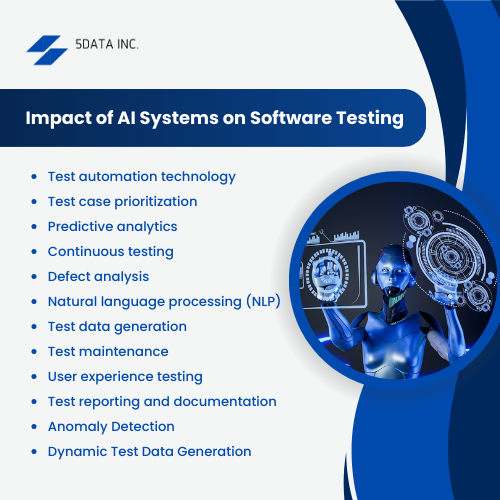Artificial Intelligence and Machine Learning (ML) are revolutionizing the digital landscape and transforming technology across various industries. As newer requirements and trends such as rapid application development (RAD) and continuous integration (CI) emerge, quality assurance teams are increasingly adopting automation at every stage of the testing process. By collaborating with bots and leveraging their capabilities to assist internal processes, testing engineers can enhance creativity and drive business development beyond customer expectations, ultimately helping products stand out in their respective markets. Assisting firms in integrating AI into their systems and apps is the specialty of software application development companies.
Building Excellence with Software Testing
Software testing is the process of evaluating a software application to identify defects or issues. It involves running the software and comparing its actual behavior to expected behavior. Testing can be carried out either manually or with the help of automated testing tools. Common types of testing include unit testing, integration testing, system testing, and user acceptance testing. The goal is to ensure that the software functions correctly and meets its requirements before it’s released to users.Software testing offers several benefits:- Bug Detection: Testing helps identify and fix software defects or bugs, preventing them from reaching end-users, which can lead to better product quality and customer satisfaction.
- Quality Assurance: Testing ensures that the software meets its specifications and functions correctly. This, in turn, enhances the overall quality of the product. Best software development services collaborate with businesses to achieve their desired standards.
- Cost Savings: Detecting and addressing issues early in the development process is often less expensive than fixing them after the software is deployed, reducing overall development costs.
- Risk Mitigation: Testing helps identify and mitigate risks associated with the software, such as security vulnerabilities, performance issues, or compliance violations.
- User Satisfaction: Thorough testing can lead to a more reliable and user-friendly product, which can enhance user satisfaction and loyalty.
- Compliance: Testing can help ensure that the software complies with industry standards and regulations, which is essential for certain applications, especially in domains like healthcare and finance.
- Improved Maintenance: Well-tested software is easier to maintain and upgrade since it’s less likely to break when changes are made.
- Enhanced Brand Reputation: Delivering a high-quality, bug-free product can boost your brand’s reputation and credibility in the market.
- Competitive Advantage: A well-tested software product can give you a competitive edge over competitors who may have released less reliable software.
- Documentation: Testing often involves creating test plans and documentation, which can serve as valuable resources for developers, testers, and future maintainers of the software.
Impact of AI Systems on Software Testing
The success of product development depends largely on the success of testing. Tests help to measure the product’s resilience, and AI test automation is used to implement DevOps principles that encourage development and operations to work together. During the DevOps lifecycle, automated tests are run more frequently and between development cycles to complement the operations processes. A constant exchange of information between the development and operations teams is essential to bring out the best in the engineering team. Incorporating the DevOps culture into testing is the next frontier and is proving to be beneficial for long-term product sustainability. Top application development companies are experienced in guiding organizations with AI-driven technologies.AI-driven software development and quality engineering have the potential to improve software testing in several ways significantly:1. Test automation technology:
AI can automate test case creation and execution, making the testing process faster and more efficient. AI algorithms can identify repetitive test cases and create scripts to run them, reducing the manual effort required.2. Test case prioritization:
AI can analyze historical test data and code changes to prioritize test cases based on their likelihood of uncovering defects. This ensures that critical areas of the software are thoroughly tested.3. Predictive analytics:
AI can have machine learning algorithms to predict potential defects or areas of the application that are likely to have issues. This enables testers to focus their efforts on the most vulnerable parts of the software.4. Continuous testing:
AI-driven quality engineering supports continuous testing by automatically running tests in the software development lifecycle pipeline. This leads to early defect detection and faster feedback to developers.5. Defect analysis:
AI can help identify patterns and root causes of defects in new technologies by analyzing historical data. This information can be used to prevent similar issues in the future.6. Natural language processing (NLP):
AI-powered NLP can assist in understanding and processing user stories and requirements, making it easier to create relevant test cases for customers.
7. Test data generation:
AI can generate realistic test data, including edge cases and boundary values, to the test suites and ensure thorough test coverage.8. Test maintenance:
AI can automatically update and maintain test scripts when changes occur in the application, reducing the effort required for test system maintenance.9. User experience testing:
AI can simulate real user interactions, helping the testers to identify usability and performance issues in the software. Best application development services have better knowledge of how to enhance user experiences.10. Test reporting and documentation:
AI can generate detailed test reports and documentation using test automation, making it easier to track and communicate the testing process and results.11. Anomaly Detection:
Machine learning models can identify anomalies and deviations in software behavior, which can help in finding unexpected defects in production systems.12. Dynamic Test Data Generation:
AI can generate dynamic test data that covers various scenarios, improving test coverage and increasing efficiency.Types of AI Driven Testing Approaches
AI-based software testing, also known as AI-driven testing, involves various testing applications and the use of artificial intelligence (AI) and machine learning (ML) techniques to enhance and automate various aspects of software testing. Here are some key aspects of AI-based software testing:- Performance Testing: AI can assist in performance testing by simulating user loads, identifying performance bottlenecks, and suggesting optimizations.
- Continuous Testing: AI can be integrated into continuous integration/continuous delivery (CI/CD) pipelines, allowing for rapid and automated testing of code changes.
- Self-Healing Tests: AI can detect and correct test script failures, reducing the need for manual intervention.
- Visual Testing: AI can perform visual testing by comparing expected and actual screen images to identify visual defects, such as layout issues or missing elements.
Conclusion
AI-based software testing has the potential to increase testing efficiency, improve test coverage, and reduce the manual effort required in the testing process. This ability can be particularly valuable in complex software projects with frequent updates and changes, where traditional testing methods may be less adaptable. Overall, AI-driven quality engineering enhances the efficiency, effectiveness, and accuracy of software testing and software quality, leading to higher-quality software products and faster release cycles. However, it’s important to combine AI with human expertise to ensure the best results and maintain the overall quality of software testing.
About the Author...
Aparna Sushumna, a mother to a hyperactive toddler who is all over the house. I aspire to be a decent content developer. A Bachelorette of technology says my qualification but I anticipated being a singer. Thanks to the recession, I dwelled into various jobs, from coding to being a tech support executive to a help desk professional, only to conclude that there is something else I wish to do. Here I am to accomplish my profound passion for content writing. Music, nature, jewelry, beauty, mythology, life quotes, celebs, and their life, being my areas of interest.
